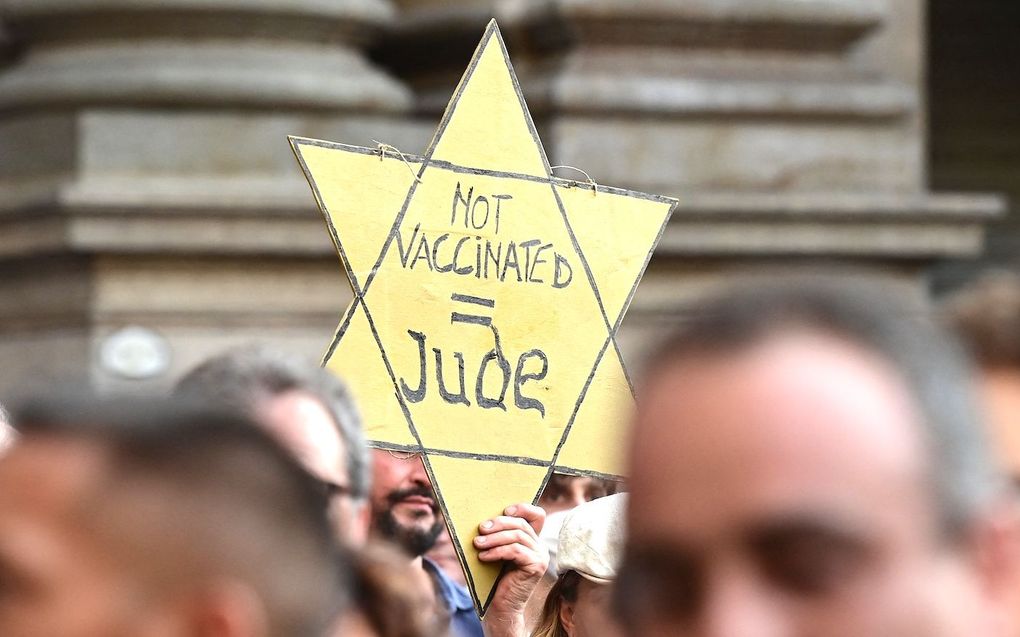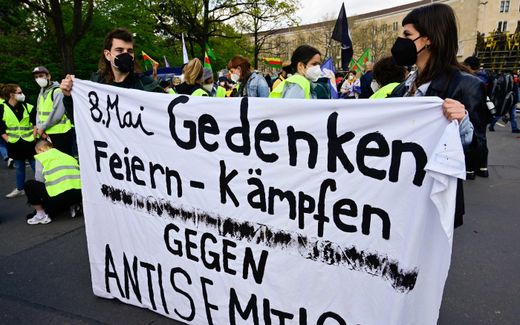Antisemitism is just about the need of a scapegoat
15-04-2022
European Union
Jonathan Steinert, PRO

The use of the Jewish star for antivaxx purposes is not appropriate. Photo AFP, Miguel Medina
European Union
Yellow stars with the word “unvaccinated”, hatred of Israel, violence against men with kippahs, talk of the world conspiracy - antisemitism has many faces. “The communicative purpose is always the same”, says German journalist Richard C. Schneider.
Schneider made a documentary series called The thing with the Jews. In it, he highlights several forms of antisemitism – from the trivialisation of the Holocaust to hatred of the state of Israel. “Today, there is often a lack of awareness of “new vessels for an age-old problem””, he says.
In your documentary, you describe left-wing, right-wing and Muslim antisemitism and everyday antisemitism. In what form do you see the biggest problem?
Richard C. Schneider: In terms of the number of attacks and crimes, antisemitism from the right is the most threatening. The second is a problem for society as a whole: that most people do not even recognise antisemitism. Due to the so-called coming to terms with the past, German society has focused very much on the antisemitism of the National Socialist era. But there is often a lack of awareness that there are now new vessels for an age-old problem. Much more clarification is needed.
How do you know that expressions like “globalists”, “those up there”, or “world conspiracy” are antisemitic? Not everyone might think of Jews.
These are cyphers that go back far into the 19th century. The “international financial elite” or “financial capital” – are old stereotypes that were positioned against so-called Jewish capital. Or the idea of the cosmopolitans or globalists, meaning the Jews supposedly trying to rule the world. These patterns already exist in conspiracy theories about the Rothschild banking family or the “Protocols of the Elders of Zion”. Today, some of these cyphers are consciously fuelled again. We experience this, for example, during the protests against the corona policy. Of course, some people use these terms without realising what they are saying. So once again: education is extremely important!
Does that mean there needs to be more of this at school, or does it need to happen at other levels as well?
Schools are a very important place for this. This applies to antisemitism as well as to many questions of racism. One should start developing sensitivity in children at a very early age so that they can take it with them into adult life. Educating adults about this is certainly helpful, too. But then, such stereotypes are often deeply rooted. I’m in my 60s; for example, my generation grew up with images and concepts, especially when it comes to black people, which we now know are deeply racist. We all have stereotypes and prejudices in our heads. Nobody is free from that.
During the demonstrations against the Corona policy, the current situation was compared to National Socialism, or unvaccinated people attached the Star of David to themselves. Do you see historical ignorance or deliberate provocation in this?
Anyone who wears a yellow star with “unvaccinated” or makes other comparisons to the Nazi dictatorship knows it is a provocation. But some may actually feel they are doing the right thing because they see themselves as victims. It’s a mixture of arrogance, a lack of historical awareness and – it sounds paradoxical – at the same time, a knowledge of history because you know that it’s provocative.
What is the communicative purpose behind antisemitic statements?
The communicative purpose is always the same: you need a scapegoat for what is supposedly going wrong. This works particularly well if you push the responsibility into the vague; one speaks of the “international elite”, the whole “system”, “those up there”, and finally, the Jews. The more diffuse it becomes, the less verifiable it is. You make yourself a poor, small, powerless victim. People who say things like that remain in a childish attitude. Adult behaviour would be to take responsibility for what you do.
But in the case of protests against the Corona policy, the addressee is the legislator, and the government enacts the measures.
That is the primary. But behind the legislature, as we have heard time and again, in this world of ideas is, for example, the – Jewish – pharmaceutical industry. Because the boss of Pfizer, Albert Bourla, is a Greek Jew, the medical director for the corona vaccine development of Moderna, Tal Sax, is Israeli. George Soros, the American-Jewish billionaire originally from Hungary, is one of them, anyway, for conspiracy theorists. And these figures are the ones who then supposedly push the federal government and members of parliament back and forth like puppets. We have also seen these posters at demonstrations where Angela Merkel and others were portrayed in this way.
Right-wing actors, in particular, use such narratives. But such narratives are also fruitful in mainstream society. Why?
First of all, one should not forget one thing: We live here in the Christian Occident. In Christianity, the Jew is deeply anchored in the culture as a scapegoat. The other thing is that life is becoming more and more complex. What happens in other parts of the world can affect me. In addition, there is a longing for simple answers because otherwise, one sees oneself as a pawn in a system that is no longer transparent. In the age of modern science, we are used to finding answers and rational explanations for everything. That is why it is difficult for us to have to live with a force majeure, for example, in the case of a virus that does what it wants.

Richard Chaim Schneider was born in 1957 in Munich. His parents were Holocaust survivors. Since 1987, he works as a journalist for the ARD. From 2005 until 2015, he was working as a correspondent from Israel, the Palestinian territories and Cyprus. He authored several books. For his work, he received numerous prices. He lives in Tel Aviv, Israel, at the moment.
A question that is being asked in coming to terms with crimes in colonial history: To what extent is the Holocaust unique? What sets it apart from other crimes against humanity?
The key difference between the Holocaust and all other genocides is that there was a redemption ideology behind the Holocaust. She explained that mankind would not be redeemed until Judaism was wiped out. This ideology saw the Jew as the ultimate evil. The other genocides have never been carried out under such a sign. But that doesn’t make them any less bad.
Israel’s treatment of the Palestinians is also sometimes compared to the Holocaust. The narrative is: What happened to the Jews then, they apply to the Palestinians today. How can you counteract this?
When someone spouts such nonsense, there’s really nothing to argue about. The murder of six million Jews in six years is nothing like what is happening in Israel due to the Palestinian conflict. To put it very cynically, there would be no more Palestinians if Israel actually behaved like the Nazis. That’s just absurd. One thing is behind this above all, apart from antisemitic tendencies: complete ignorance of the reality on the ground. I also ask myself: Why does someone say something like that? Then we are quickly back to our own sensitivities here in Germany, which have nothing to do with Palestinians and Israelis. But with a defence against guilt and responsibility.
When is criticism of Israel antisemitic?
Let’s first take a look at the term criticism of Israel: Israel is the only country for which there is such a fixed formulation in German. There is no criticism of China, no criticism of Russia, no criticism of America; there is only criticism of Israel. For all other countries, it says “Criticise”. That alone shows that a different standard is used here. The distinction between criticism of Israel and antisemitism is simple: antisemitism begins where Israel is meant as a whole, where its existence is not accepted. If I criticise the Israeli government, and its policies – what’s wrong with that? That must be possible in every democracy. This also applies to Israel, of course.
What does this mean for solidarity with the Palestinians? WDR has ended its collaboration with Palestinian journalist Nemi El-Hassan after she was accused of once taking part in the al-Quds march and making anti-Israel comments on social media.
The solidarity of a Palestinian with Palestinians is normal. There is absolutely nothing to be said against it. But it becomes difficult when someone takes part in the al-Quds march, which calls for the annihilation of the State of Israel. Nemi El-Hassan apologised; I accept that. She is also said to have liked extremely anti-Israel tweets. Then came the defensive argument: These were tweets from an anti-Zionist American Jewish organisation. This may be, but if someone is anti-Zionist, even as a Jew, they are against Israel’s existence, and I have a problem with that.
How do you rate the pro-Palestinian Israel boycott movement BDS (boycott, divestment, sanctions)? The Bundestag has classified them as antisemitic. But some cultural workers criticise this and say: With this decision, many Jewish voices are also ignored.
At the time, I thought to myself: Why is it necessary? This unnecessarily upgrades BDS. This resolution is not legally binding, and you can, of course, criticise it. Some Jews say BDS is anything but antisemitic. I disagree with you. I say: parts of BDS are anti-Semitic because they also demand the dissolution of the State of Israel.
In Germany, violence against Jews and attacks on synagogues also come from Muslims. However, in your film, you warn against speaking of “imported antisemitism”, as various politicians have done. Why?
This “imported antisemitism” formulation is fuelled primarily by right-wing circles, who use it to pretend that there is no antisemitism in Germany. The Jews’ only problem is the Muslims. Does Muslim Antisemitism Exist? Clearly. Is this a problem? Yes! But behind the notion of “imported antisemitism” lies a political agenda. It is there to wash oneself clean, to make Muslims the scapegoats and thus to find one more argument to get rid of them here again – with the term, this is done on the backs of the Jews. No thanks!
This article was translated by CNE.news and previously published in the Christian German Magazine PRO on February 16th, 2022.
Related Articles





